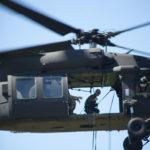WASHINGTON – The US Department of Transportation announced on Friday a final rule for the safe transportation of flammable liquids by rail.
The finale rule, developed by the Pipeline and Hazardous Materials Safety Administration and Federal Railroad Administration in coordination with Canada, focuses on safety improvements that are designed to prevent accidents, mitigate consequences in the event of an accident, and support emergency response.
The rule includes an enhanced tank car standard and a risk-based retrofitting
schedule for older tank cars carrying crude oil and ethanol; requires
a new braking standard for certain trains; designates new operational
protocols for trains transporting large volumes of flammable liquids,
such as routing requirements, speed restrictions, and information for
local government agencies; and provides new sampling and testing requirements
to improve classification of energy products placed into transit.
Local authorities are concerned because of the number of tank cars traveling through the Mid-Hudson while carrying Bakken crude oil.
The rules are “common-sense and in some cases long overdue; we’ve known these DOT-111 cars were hazardous for 23 years, so time’s up,” said Congressman Sean Patrick Maloney (D, NY18).
“The key is that it is implemented as fast as possible, but the bottom line is that we will be getting the most dangerous tanker cars carrying the most dangerous material off the rails in the quickest possible time frame and that is very important,” Maloney said.
Congresswoman Nita Lowey (D, NY17) is encouraged by the rule.
“It’s a step in the right direction to prevent the next tragedy, but more must be done to ensure families in the Lower Hudson Valley are safe from crude oil accidents,” Lowey said
US Senator Charles Schumer said the rule is both good and bad news.
“The good news is that the standards for tank cars are tough and provide certainty, but the phase-in timeline lets the railroads take too long to implement it,” Schumer said
The new regulations still leave the public and river at risk, charged three leading environmental groups – Scenic Hudson, Riverkeeper, and Waterkeeper Alliance. They maintain the rules allow the most common and dangerous rail tanker cars, the DOT-111s, to remain in use for an extended period of time. They also said they fail to address any dangers posed by shipping heavy Canadian tar sands crude by rail, “an emerging threat in the Hudson River Valley.”







